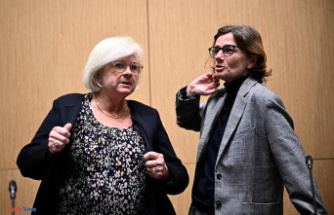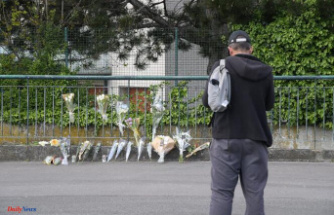Maria Bester from Aachen has always been adventurous. She has traveled as far as South Africa in a converted ice cream truck. Bester now lives in one of the most remote places in the world. On a lonely peninsula in Madagascar, she literally raises her children in the jungle.
It's almost like in a kitsch novel: a wooden house on the white sand beach, palm trees sway in the warm breeze, humpback whales play in the crystal clear water. For Maria Bester, who was born in Aachen, this is part of everyday life. The 38-year-old adventuress has been living with her husband and two children in one of the most remote corners of the Southeast African island state of Madagascar for eleven years.
Masoala Forest Lodge, which Bester manages with her South African husband Pierre in the middle of the rainforest, is a tiny speck on the map. It's only a 40-minute boat ride there -- or a four-day hike. There are no cars on the entire peninsula, which covers 2400 square kilometers of the UNESCO-listed Masoala National Park, only small trails too sandy even for bicycles. Only about 1,000 people live in the Luxembourg-sized area - including the Besters with their children, eight-year-old Salma and six-year-old Charlie.
Bester has always had a thirst for adventure. Since childhood she has enjoyed traveling to distant countries, is interested in foreign cultures and likes to meet people who think differently. But she never dreamed that she would live for more than a decade on a sparsely populated island paradise in northeast Madagascar, says Bester, who describes herself "actually as a real city kid."
Bester's love for Africa began after studying to become a teacher. She converted an old ice cream van and drove for twelve months in 2009 from Germany through Eastern Europe, Syria, Jordan, Egypt, Sudan, Kenya and Tanzania to the southern tip of Africa. At the end of the journey, in the tourist metropolis of Cape Town, Bester met her future husband, who was busy setting up a lodge in Madagascar. Best was curious. Another adventure called. She flew to Masoala for six weeks to look at the area, but realized: "No, that's not for me. That was too strange for me." As a sociable, social person, she simply could not imagine living in an isolated, albeit picture-perfect place. "I've always been on the road a lot, I enjoyed spending time in museums, at concerts and in the theater and often met up with friends," she says. She didn't want to give that up.
With a heavy heart, Bester returned to Aachen and decided to open an interior decoration shop. But a few months later, Pierre was at the door - and love won. "I decided primarily for the man and not for the lifestyle, which I quickly became enthusiastic about," she says. The early years were not easy, despite the idyllic surroundings with activities such as snorkeling on coral reefs or hiking with lemurs. While the official language in the capital Antananarivo is French, in Masoala only a dialect of the local language Malagasy is spoken. "There's no dictionary for that. The first year I was pointing at things all day and asking, 'What's that called? What's that called?" she recalls.
To call Maria Bester's life unusual is an understatement. The nearest place for shopping, the small port town of Maroantsetra, is only accessible by boat. Once or twice a week people shop there at the market. There is only what is in season. Bester grows fruit and vegetables such as mangoes, pineapples, avocados, lettuce and herbs in her garden. The lodge bakes its own bread, and Maria buys fish and seafood directly from the fishermen on the beach. Cheese is considered a great luxury in Madagascar and is only available in the capital. Reliable health care is also several hours away by flight.
"There were moments when I would have liked to stand in a corner and cry," Bester remembers the early days. But with her contagious positive nature and her energetic zest for action, she was up for any new challenge. "Actually, I like this uncomfortable area where you face the unknown but can learn a lot," she says.
When Bester had children, life on the island paradise changed drastically. Since there was neither a kindergarten nor a preschool, Bester made this a project. She found a building, trained two local women teachers, designed a curriculum, and is now supporting 22 children in early education. The village community describes Bester as creative, innovative and helpful, someone who is constantly trying to improve life for everyone. "She has a good relationship with the people in the village and is very popular," says Ninize Mahazosoa, one of the teachers. Dash Walczak, who works with Bester at the lodge, describes her as "enormously empathetic", someone who "always has the best interests of others in mind and works passionately and tirelessly for the community".
Bester's own children also attend preschool. Her way to school is an adventure in itself: first it leads along the beach, then through the rainforest and across three rivers. "The first two are quite shallow, but the third is sometimes up to your neck in water," laughs Bester. Then the satchel comes upside down; a set of dry clothes is included. "My kids love to run in the rain, help polish the floors with coconuts, go to sea with the fishermen after school," says Bester.
So far, her adventures in life have mainly brought her admiration, maybe a little bit of envy, but little criticism. "I actually never get negative comments. Most of them just can't really imagine what life is like here," she says, "but they just find it exciting".
(This article was first published on Sunday, July 24, 2022.)












